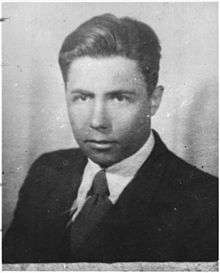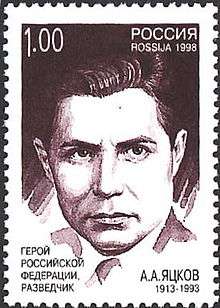Anatoli Yatskov
| Anatoly Yatskov | |
|---|---|
 Photo of Yatskov from Rosenberg trial files, taken before 1950 | |
| Born |
Anatoly Antonovich Yatskov Анатолий Антонович Яцков 31 May 1913 Bilhorod-Dnistrovskyi, Russian Empire |
| Died |
26 March 1993 (aged 79) Moscow, Russia |
| Spying career | |
| Allegiance |
|
| Service | NKVD |
| Active | 1940–1993 |
| Codename(s) | John, Alexei, Anatoly Yakovlev |

Anatoly Antonovich Yatskov (Russian: Анатолий Антонович Яцков; 8 May [O.S. 31 May] 1913–26 March 1993), also name as Anatoli Yatzkov—code name: Anatoly Yakovlev[1]—was a Russian diplomat and spy who was the General Consul of the Consulate-General of the Soviet Union's delegation in New York City in the 1940s.
His diplomatic cover was exposed by the efforts made by the U.S. Army who identified him as a senior case officer in the NKVD's spy network active in the United States in 1950, though he had been dispatched back the Russia in 1946.[2]
Career
Yatskov began work in the central apparatus for external reconnaissance in 1940. In 1941 he was sent to the New York Rezidentura as an operational worker. He carried out critical operations on the acquisition of information on the Manhattan project ("ENORMOZ"). This information allowed Soviet scientists to obtain the highly useful data about the building of facilities for production of weapons-grade uranium and plutonium, and also directly on the production of the atomic bomb.
Yatskov collaborated with Harry Gold, who stole industrial formulas from the Pennsylvania Sugar Company, and Soviet Union spymaster Alexander Feklisov in the infiltration of the United States' Manhattan Project by having Gold liaise with scientist Klaus Fuchs.
He also was one of the handlers of Julius Rosenberg and was originally named in the indictment against the Rosenbergs, Morton Sobell and David Greenglass. However, Yakovlev was excluded from the indictment due to diplomatic immunity, and had, in any case, returned to the USSR four years prior to the indictment.[3]
After returning to the Soviet Union, Yatskov continued to work in control of scientific and technical intelligence. He repeatedly was engaged in operational work in Europe and Asia.
Yatskov, in an interview in October 1992, said the FBI uncovered "perhaps less than half" of his network. He referred to Perseus as a code name for a major source still alive.
Honors
Yatskov was awarded the Order of the October Revolution, Order of the Red Banner of Labour, and the Red Star, and the badge of "Honorable State Security Agent". On 15 June 1996, Yatskov was posthumously awarded the highest honorary title of the Russian Federation, Hero of the Russian Federation, for his lifetime achievements.
References
- ↑ "Spy Biographies" (PDF). Archived from the original (PDF) on 27 September 2013.
- ↑ "FBI page".
- ↑ "Spy Biographies" (PDF). Archived from the original (PDF) on 27 September 2013.
- John Earl Haynes and Harvey Klehr, Venona: Decoding Soviet Espionage in America (New Haven: Yale University Press, 1999). ISBN 0-300-08462-5